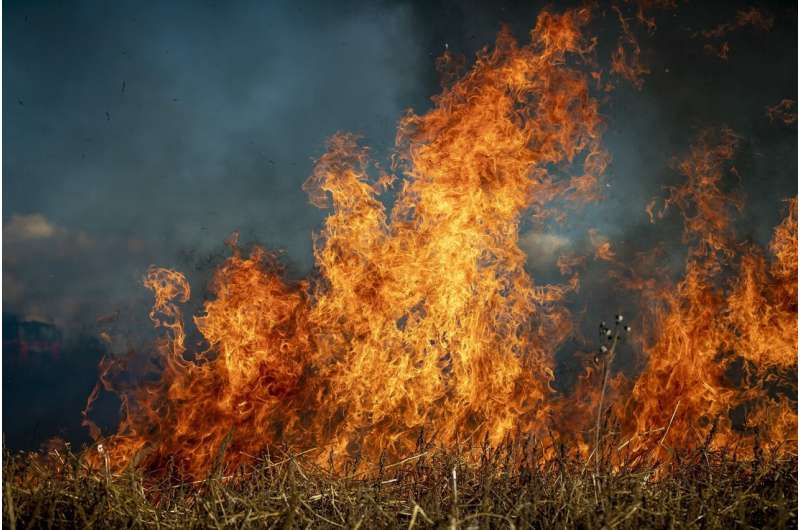This article has been reviewed according to Science X's editorial process and policies. Editors have highlighted the following attributes while ensuring the content's credibility:
fact-checked
reputable news agency
proofread
On wildfires, experts say the West needs to rethink its response

Wildfires and the pain they cause to people, property and the planet are here to stay. And if Western management practices don't change to anticipate more and more record fire years, that pain may spread and worsen.
"It's no longer about living with fire," said Stephen Pyne, an Arizona State University professor who has written more than 30 books about fire and related environmental history. "It's about living with a fire age."
That was the message of the Desert Research Institute's inaugural Adaptable World Environment summit at Encore Las Vegas, focused entirely on how leaders can better prepare communities for the growing danger of fire in a warming world. It brought together utility regulators, water managers and fire scientists to share solutions.
The conference was well situated in Nevada, the state with the country's two fastest-warming cities that are experiencing more days with wildfire weather than ever before, according to science communications firm Climate Central.
Perhaps the most life-threatening Nevada fire so far of 2024 was the nearly 700-acre Gold Ranch Fire that could have burned hundreds of homes near Verdi, a small town in Washoe County. Southern Nevada's fires have been small and quickly contained.
It's still nothing compared with California's Park Fire, the state's fourth-largest fire ever recorded that had burned 670 square miles and destroyed more than 630 buildings in Northern California as of Thursday. And there isn't an end in sight—for the Park Fire and the West's fire problem in general—in the face of climate change, conference panelists said.
"We are the fire creature. Fire is our ecological signature. It's always been our identity," Pyne said. "We can do this. Good fire made us. Bad fire may break us. But, really, that choice is ours."
Prevention, not reactions
To Sarah McCaffrey, a retired and widely published U.S. Forest Service social scientist, much of what agencies need to "thoroughly rethink" about management is what happens before fire catches at all. The missing aspect is social, she said.
Historically, federal agencies have invested in fire response after the fact rather than investing in community education, McCaffrey said.
There needs to be more study of how to best reach as many homeowners as possible when agencies ask them to take action against fires, she said, though it's impossible to reach every single one. It's hard to define a "fire-adapted" community, she said.
"That's never going to happen," McCaffrey said. "You're never going to get 100 percent. So what is it? What is herd immunity for a community?"
The Nevada energy picture
In the Silver State, NV Energy's grid can either stoke or take away steam from fires.
Doug Cannon, CEO of NV Energy, said infrastructure such as below-ground energy lines that promote wildfire prevention are often a luxury rate-payers don't want to reach into their wallets for every month.
But if investments aren't made now, it'll cost taxpayers money later on in utility lawsuits and insurance costs, he said.
"There's a disconnect between what society wants and what society is willing to pay for that want," Cannon said. "We, at some point, have to make a connection there."
He said utilities need an insurance solution similar to the Federal Deposit Insurance Corp., the federal solution that helped insurance companies trust banks after the Great Depression.
It's affecting homes, too: This month, Nevada's top insurance official told lawmakers that insurance companies are canceling more home insurance policies than ever solely because of wildfire risk.
"Do we set up a similar national insurance fund that becomes the backstop for these wildfire costs across the country, so that insurers and lenders can still have confidence that the electric system can continue to grow?" Cannon asked.
In the past few years, the process of "de-energization," or shutting off service, has become NV Energy's most prominent response to wildfire.
Jesse Murray, vice president of energy delivery and natural disaster protection for NV Energy, said the priority has always been to keep service on, but studies have shown it is effective in fighting fire.
A former California Public Utilities president pushed back on de-energization, pointing out that it can cut off medical devices and water service.
"It can be an adjustment period," Murray said in response. "I'm the one, personally, that's pushed the button 20 times for NV Energy to de-energize customers now, and it still feels weird."
Wildfires wreck water, too
Water managers in Las Vegas and Reno must pay close attention, too, to whether fires will worsen water quality in the rivers on which their cities rely to drink.
Kara Steeland, a hydrologist with the Truckee Meadows Water Authority in Northern Nevada, said the Gold Ranch Fire in Verdi occurred immediately upstream of one of the region's biggest reservoirs.
Though there was no decline in water quality on the Truckee River, fires have become a wider concern for water managers across the West. The Martis Fire in 2001 was an example where water was affected, she said.
Steeland said the water authority is one of many that are working with the Forest Service to improve forest management upstream of their reservoirs. The project is anticipated to cost $140 million in funding that hasn't been secured yet.
"We don't have alternative supplies, so the river is essential to our community," Steeland said. "If a similar incident occurs, we're thinking about what we can do both proactively and then potentially reactively in terms of erosion control."
2024 Las Vegas Review-Journal. Distributed by Tribune Content Agency, LLC.





















